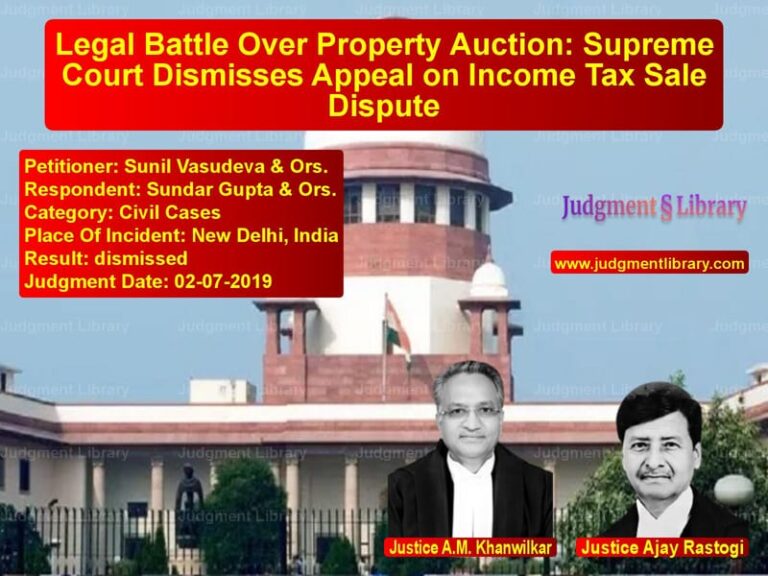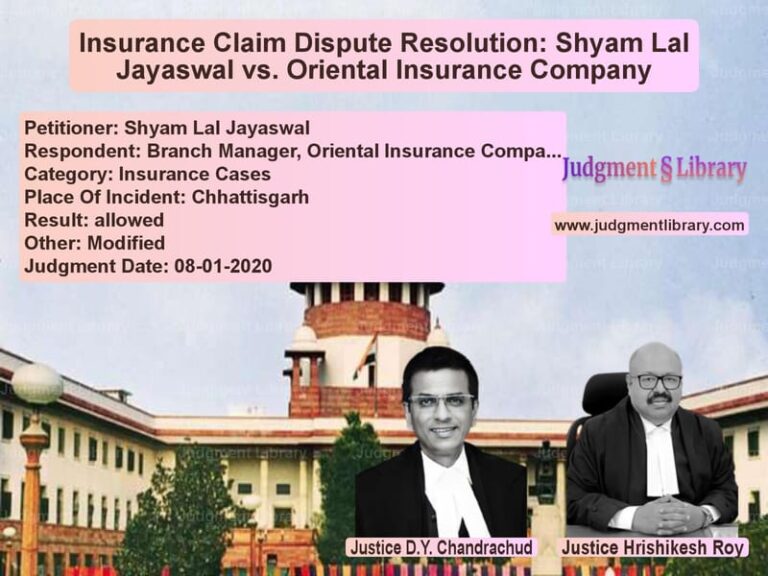Property Partition Dispute: Supreme Court Upholds Will and Confirms Division of Ancestral Home
The case of Sajan Sethi v. Rajan Sethi revolves around a property partition dispute between two brothers over their ancestral home in New Friends Colony, New Delhi. The Supreme Court was called upon to determine the rightful ownership and usage rights of different portions of the property in accordance with the Will executed by their deceased mother, Smt. Krishna Sethi.
The case originated when the respondent, Rajan Sethi, filed a partition suit for the second floor and terrace rights of the house. The appellant, Sajan Sethi, raised additional claims regarding common areas on the ground floor, which led to a legal battle over property rights. The Supreme Court, after evaluating the Will and the evidence presented, ruled in favor of the original partition order while modifying certain directions regarding shared spaces.
Background of the Case
The disputed property, located at D-1090, New Friends Colony, New Delhi, was originally owned by the parties’ father, late S.L. Sethi. Upon his demise, ownership of the house was transferred to their mother, Smt. Krishna Sethi, through a legally valid Will.
Before her passing, Smt. Krishna Sethi executed a Will on January 27, 2005, specifying the division of the house among her two sons:
- The ground floor was bequeathed to the elder son, Rajan Sethi.
- The first floor was bequeathed to the younger son, Sajan Sethi.
- The second floor was to be equally divided, with the front half going to Sajan Sethi and the back half to Rajan Sethi.
- Neither son was allowed to sell their share of the property to outsiders without first offering it to the other.
Despite this clear division, disputes arose regarding the partition of the second floor, terrace rights, and common areas on the ground floor.
Key Legal Issues
- Whether the second floor and terrace rights were subject to partition.
- Whether the common areas on the ground floor were to be included in the partition proceedings.
- Whether the directions issued by the High Court regarding shared spaces were legally justified.
Arguments by the Petitioner (Sajan Sethi)
Sajan Sethi contended that:
- The High Court and the Trial Court erred in deciding the rights over common areas on the ground floor when the suit was only for partition of the second floor and terrace.
- Since the entire property was divided equally, the common areas should also be shared equally.
- The court should not have issued directions restricting his use of the driveway and staircase.
Arguments by the Respondent (Rajan Sethi)
Rajan Sethi argued that:
- The suit was limited to the partition of the second floor and terrace rights, and the common areas on the ground floor were brought into dispute by Sajan Sethi himself.
- The Will clearly defined the ownership rights, and the appellant’s claims over the common areas were beyond the scope of the case.
- The High Court correctly restricted the appellant’s access to the driveway while allowing him necessary access to utilities.
Supreme Court’s Observations
The Supreme Court analyzed the division of property as per the Will and upheld the High Court’s decision while modifying certain directions. The Court stated:
“The parties are claiming rights pursuant to a Will executed by their mother. The division of the property is clear and must be upheld as per the testator’s intent.”
The Court emphasized that the common areas were brought into dispute by the appellant himself, and since the trial court had framed an issue on them, they had to be adjudicated.
Final Judgment
The Supreme Court upheld the division of the second floor and terrace rights, confirming that each brother had a 50% share. Additionally, the Court issued the following directions regarding common areas:
- Sajan Sethi cannot use the small driveway on the ground floor.
- Sajan Sethi is allowed to use the booster pump and water pipes located in the rear courtyard.
- The respondent (Rajan Sethi) is permitted to construct a door on the second-floor landing for access to his portion.
Conclusion
This judgment reinforces the principle that property division must adhere to the clear intent of the testator. The ruling highlights:
- Will-based inheritance must be respected to prevent unnecessary litigation.
- Common areas in jointly owned properties should be carefully demarcated.
- Legal heirs cannot claim additional rights beyond those explicitly granted in the Will.
The Supreme Court’s decision ensures fairness and prevents misuse of legal proceedings to alter property rights beyond the testator’s intentions.
Petitioner Name: Sajan Sethi.Respondent Name: Rajan Sethi.Judgment By: Justice Mohan M. Shantanagoudar, Justice R. Subhash Reddy.Place Of Incident: New Friends Colony, New Delhi.Judgment Date: 02-03-2020.
Don’t miss out on the full details! Download the complete judgment in PDF format below and gain valuable insights instantly!
Download Judgment: Sajan Sethi vs Rajan Sethi Supreme Court of India Judgment Dated 02-03-2020.pdf
Direct Downlaod Judgment: Direct downlaod this Judgment
See all petitions in Property Disputes
See all petitions in Succession and Wills
See all petitions in Judgment by Mohan M. Shantanagoudar
See all petitions in Judgment by R. Subhash Reddy
See all petitions in dismissed
See all petitions in supreme court of India judgments March 2020
See all petitions in 2020 judgments
See all posts in Civil Cases Category
See all allowed petitions in Civil Cases Category
See all Dismissed petitions in Civil Cases Category
See all partially allowed petitions in Civil Cases Category







